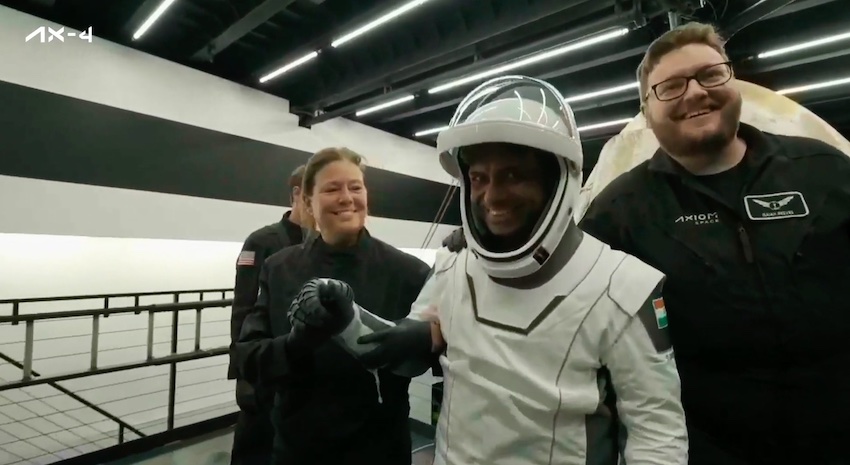Group Captain Shubhanshu Shukla, the first Indian astronaut to visit the International Space Station (ISS) in four decades, has safely returned to Earth after concluding his momentous journey as part of the Axiom-4 (Ax-4) mission. His spacecraft, Dragon Grace, carrying three other international astronauts, landed off the coast of San Diego at about 3:01 PM IST on 15 July, marking the culmination of a mission that has moved the nation and furthered India’s ambitions in human spaceflight.
Celebrations and National Pride
Prime Minister Narendra Modi led the nation in congratulating Shukla, describing his return as “another milestone towards our own Human Space Flight Mission – Gaganyaan.” The Prime Minister lauded Shukla for inspiring “a billion dreams through his dedication, courage and pioneering spirit.”
Union Minister Jitendra Singh celebrated the feat as a “moment of glory for India,” saying the nation had “truly found an enduring space in the world of Space” as another illustrious son completed a successful voyage.
Back in Lucknow, Shubhanshu Shukla’s family cut a cake in celebration and offered prayers of thanks. His mother, Asha Shukla, expressed her overwhelming happiness: “My son has safely returned, I thank god, you all who have covered the event. I got emotional, after all, my son has returned after many days.” Shukla’s home was decorated and filled with family members and well-wishers awaiting his return, with his mother reciting ‘Sunderkand’ and the entire family keeping a close eye on updates right up to splashdown.
Return Journey: Every Detail
Shukla’s journey back to Earth followed a meticulously planned sequence:
– Undocking and Departure: After an 18-day stay aboard the ISS, Shukla and his Ax-4 crewmates undocked from the station at 4:45 PM IST on 14 July, following a brief delay from the originally scheduled time.
– Separation Maneuvers: The Dragon spacecraft exited the ISS’s safety zones—the ‘keep out sphere’ (200 metres) and the approach ellipsoid (approx. 4 km)—before beginning its controlled descent.
– De-orbit Burn and Re-entry: The de-orbit burn commenced at 2:07 PM IST, lasting just under 18 minutes, during which communication was temporarily lost, as expected. After the burn, the spacecraft jettisoned its trunk and reoriented its heat shield to face re-entry temperatures reaching 1,600°C.
– Splashdown Sequence: Parachutes deployed in two stages—small stabilising chutes at around 5.7 km altitude, followed by main chutes at nearly 2 km—ensuring a smooth splashdown 22.5 hours after leaving the ISS.
Mission Achievements and Science
During their nearly 20 days aboard the ISS, Shukla and the Ax-4 crew completed over 310 orbits of Earth, travelling a staggering 1.3 crore kilometres—equivalent to circling the distance between Earth and Moon 33 times. Daily life brought unique experiences, such as witnessing more than 300 sunrises and sunsets from orbit and participating in light-hearted moments like taking “chaotic” group photos in microgravity, which delighted audiences back on Earth.
Scientifically, Shukla and the crew performed over 60 experiments spanning fields such as human health, space agriculture, space suit materials, and mental well-being. According to ISRO, Shukla completed specific experiments on Indian tardigrades, myogenesis, the sprouting of methi and moong seeds, studies on cyanobacteria and microalgae, and tests involving crop seeds and a voyager display—all successfully planned and executed. The mission comes just ahead of ISRO’s Gaganyaan programme, further strengthening India’s global collaborations in space exploration.
United in Hope and Aspiration
This mission was not without political commentary, reflecting the broader significance of representation in such landmark national moments. While celebrations echoed nationwide, figures like Congress’ Udit Raj made public suggestions about social representation in astronaut selection, adding to the public discourse.
Yet, the overwhelming mood was one of national unity, pride, and aspiration. The Director of ISRO’s Space Applications Centre, Nilesh M Desai, termed Shukla’s space journey as “an unforgettable experience,” reinforcing the impact of his mission on the Indian scientific community.
Looking Forward
As Shubhanshu Shukla prepares for post-mission rehabilitation and scientific debriefings, his story stands as a symbol of what hard work, courage, and ambition can achieve. His achievements aboard the ISS are not just personal milestones but milestones for a nation now poised for its own indigenous human spaceflight—Gaganyaan.
With Shukla’s safe return, India has truly entered a new era in space exploration, inspiring millions and paving the way for even greater ambitions in the cosmos.


